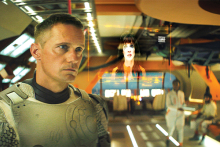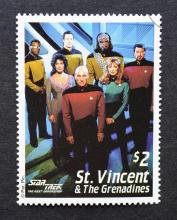sci-fi

I’VE SPENT MOST of my life explaining to people why movies and TV shows are more than just a way to pass time. My favorite screen stories — serial or cinematic — help me connect with their creators or the depicted characters. Narratives help us make sense of our experiences and recognize ways we can help others consider their own. Jesus knew this when he told parables, using stories to communicate some of his most important teachings on how we should live generously and faithfully.
A sci-fi series about a robot who struggles to relate to human beings may seem an unlikely example of how good storytelling helps us walk through the world. But that’s what the Apple TV+ show Murderbot offers.

I contain multiple identities. On the one hand, I am a Black man whose ancestors were enslaved, then pushed into ghettos, and now exploited through the unjust prison labor system. On the other hand, I am living on the stolen land of the Duwamish people. I can’t escape the colonial history of the U.S. and its reverberating effects.
There are times when I try to convince myself that, because I am a Black person living in the U.S., it’s not my responsibility to wrestle with the legacy of colonialism and how I might be a beneficiary of that history. However, after my conversation with author and activist Patty Krawec, I am convinced that I need to view myself through a more complicated lens.

MIDWAY THROUGH THE second half of Wim Wenders’ Until the End of the World, the movie’s narrator, Eugene (Sam Neill), plays music with a group of characters in an Australian village. Eugene is on piano, his friend David (David Gulpilil) plays the didgeridoo, a German private investigator (Rüdiger Vogler) wails on a harmonica, and a French bank robber (Chick Ortega) plays drums while they wait anxiously for news about the destruction of a nuclear satellite, which, we’re told, would bring about Armageddon.
Eugene reflects on the journey that’s led the group here and realizes this communal moment of joy in the face of fear is its apex. He calls it “a prayer for the wounded earth.” In many ways, this 1991 global sci-fi odyssey, recently released in a director’s cut by the Criterion Collection, feels like exactly that. It’s a prayer for not only its fictional future earth but the self-involved world we live in now, a world drunk on idealized images of ourselves.

The future for Roddenberry is not homogenous. Differences are embraced, not erased. Crews made up of different species, sexual orientations, genders, ages, and abilities each contribute in their own way to success of the ship’s mission.
The future envisioned by Star Trek is one of bringing more and more people into community, embracing difference, and proclaiming the entire society’s benefit to increased diversity. Star Trek, if we’re going to be blunt, is better known for what Christianity should be known for in our 21st century context

Taken purely as entertainment, Jeff Nichols’ film Midnight Special is a smart, tersely constructed sci-fi adventure in the vein of classics such as E.T. and Close Encounters of the Third Kind. That it aspires to those heights alone (and it comes very close) makes it worth seeing. But what makes Midnight Special great is that it’s also a film about belief, or the desire to believe — one that advocates for sacrificial love over fear and control, and is content with asking more questions than it answers.

Here at Sojourners, we're more than a little bit excited about Star Wars week. I mean, have you seen the cover of our January issue?
And today, we're launching a new online series "Keeping the Force: How Sci-Fi and Fantasy Show Us the Divine." So, yeah. When we saw this amazing Star Wars medley featuring Jimmy Fallon, The Roots, AND the cast of The Force Awakens, including the indomitable Carrie Fisher, we just had to share. Enjoy!

Series writers (which included Vince Gilligan of later Breaking Bad acclaim) were never exactly subtle with their nods to faith. While Mulder was an atheist, his constant journey to a truth larger than himself, and indeed, this world, mirror many a sojourner, albeit perhaps without the little green androgynous beings. And Scully’s faith as a child in the unquestionable Catholic Church, and then as a doctor in science above all, and then as a lover and a mother in a more tangible God, allowed for a deeper-than-average glimpse at the push-pull relationship between blind belief and pure, clinical reason.
So NPR just released the results of their survey for the "Top 100 Science-fiction and Fantasy Books." It's a great list with some of my all-time favorite books on it (although I disagree with their decision not to include young adult books on the list, but that's just me). Some 5,000 books were nominated for the list, but the ones that made the top 100 were mostly ones that were more than just entertaining stories; they are the stories that mean something. Stories that through their imaginings of alternative worlds tap into the power of the prophetic to deliver the message that our world too is not absolute, but imagined and therefore capable of change.
Now, while I have complained in the past about why imaginative challenges to oppressive orders in our world only seem to happen in speculative fictions, the genre still remains my favorite -- often for that very reason. As this recent comparison of women of sci-fi vs. women of prime time shows, there are just so many more substantial ways of being in the world than the status quo generally allows for. Speculative fictions not only present the possibility that the dreams we struggle for now could someday actually be realities, they are also the prophetic voice calling us into that world.
After the synchroblog last week and all the discussions surrounding the question of if the emerging church is too white, I've had a number of interesting discussions regarding the ways in which the voice of the subjugated other (subaltern) finds a space